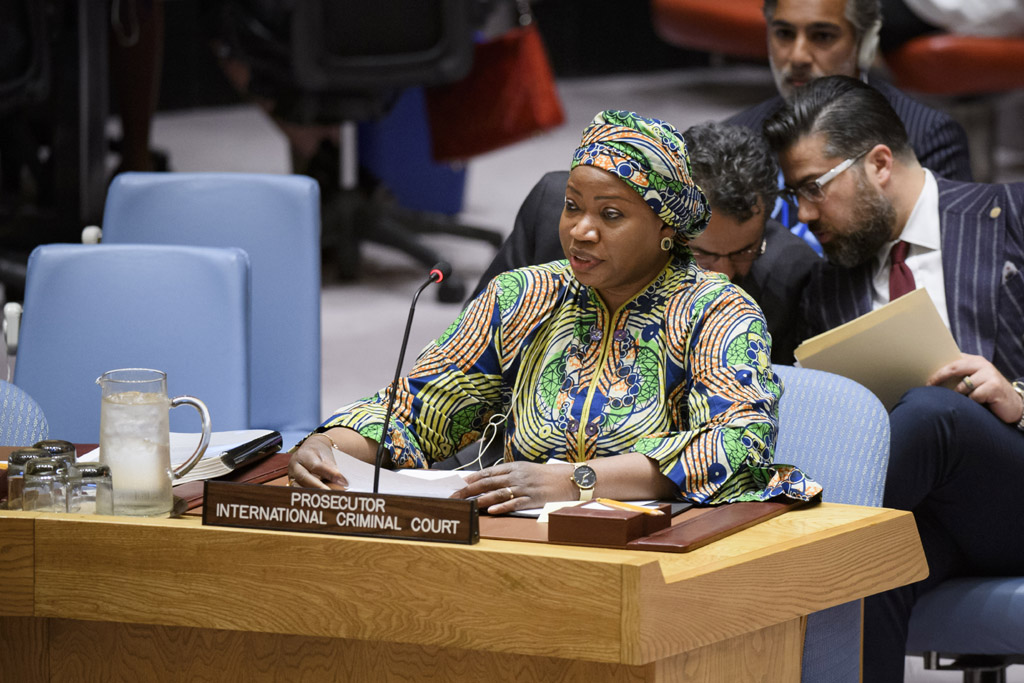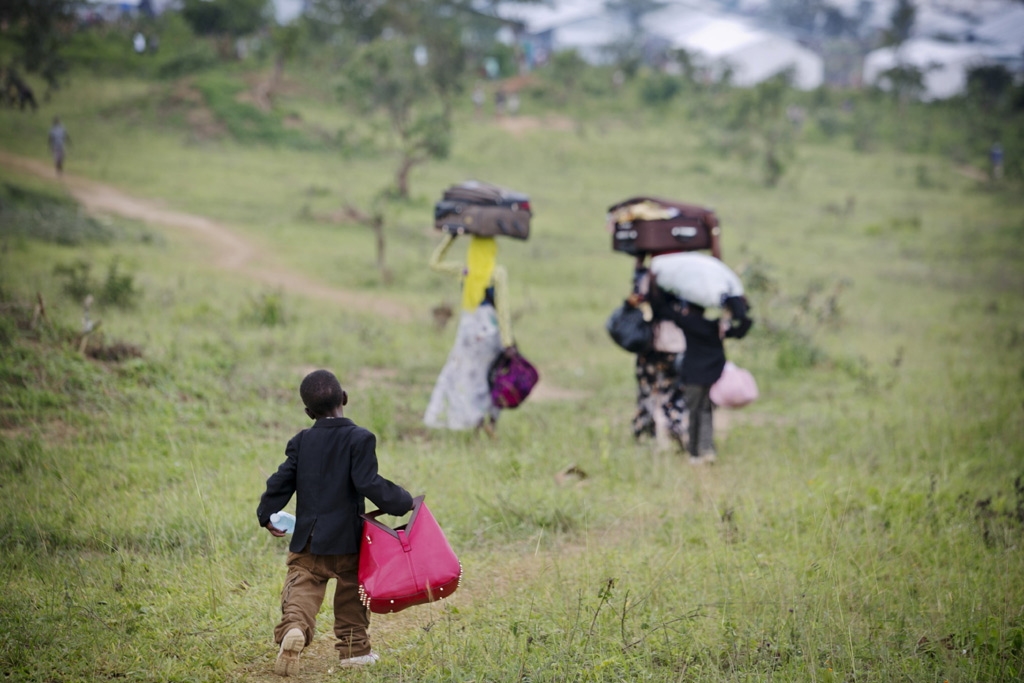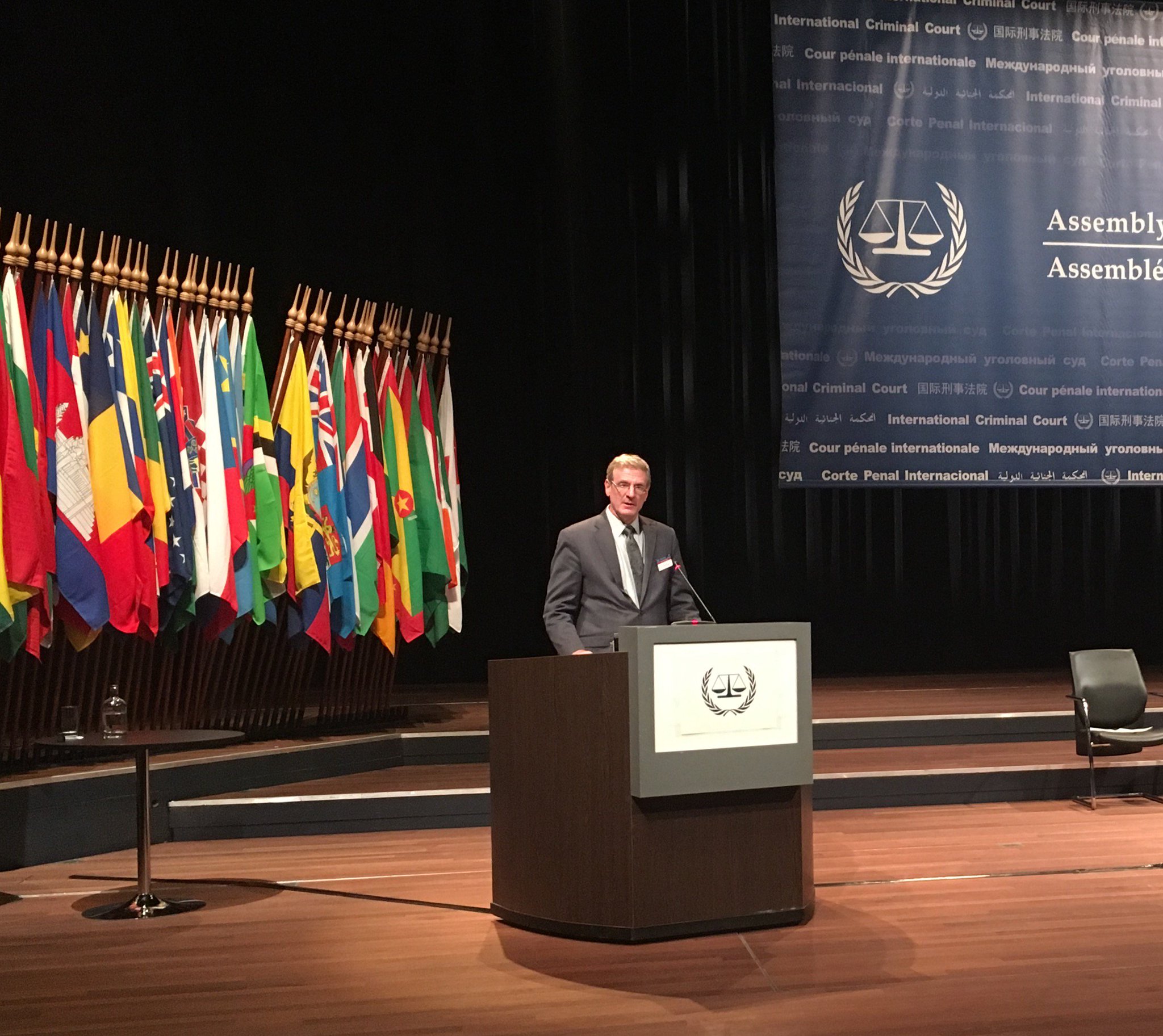By: Kristin Smith
The ICC turned 15 years old on July 17, 2017 (a date which celebrates the July 17, 1998 adoption of the Rome Statute). The day has come to be known as “International Justice Day” or the “Day of International Criminal Justice,” and aims to raise awareness of the ICC and its goals, as well as highlight the global importance of international criminal justice. With these aims in mind, here are a few recent international criminal justice developments you might have missed:

ICC Chief Prosecutor Fatou Bensouda briefs the UN Security Council on the situation in Sudan on June 8, 2017 [UN Photo by Manual Elias]
The ICC and Africa
African States and other critics have long expressed concerns about the concentration of ICC prosecutions against Africans. However, most situations before the Court were referred by African States themselves or the UN Security Council, and the Chief Prosecutor has stated that her office seeks justice on behalf of the African victims of atrocities, many of whom have no other avenue for justice. In February 2017, the African Union passed a non-binding resolution at its Annual Summit Meeting supporting members’ withdrawal from the ICC, despite the objections of many African States who spoke against such action at the AU meeting and last year’s ICC Assembly of States Parties. However, recent research on the effects of these arguments in Kenya (whose officials have often called the Court biased) shows that ordinary Kenyans do not necessarily think the ICC is biased against Africans, and the percentage of those who disagree with assertions of bias is particularly high among victims of post-election violence in 2007/2008 (the subject of the ICC’s investigation in the Kenya situation).
On July 6, 2017, an ICC Pre-Trial Chamber unanimously found that South Africa had failed to comply with its obligations as an ICC State Party by failing to arrest Sudanese President Omar al-Bashir (despite an order to do so by the South African High Court) when he visited for an African Union Summit in 2015. The Pre-Trial Chamber found that neither the Host Agreement for the African Union Summit nor any head of state immunity that might exist under customary international law would support South Africa’s failure to arrest Bashir, since “article 27(2) of the Statute applies equally with respect to Sudan, rendering inapplicable any immunity on the ground of official capacity belonging to Sudan that would otherwise exist under international law.” However, the Pre-Trial Chamber decided not to refer South Africa’s noncompliance to the ICC Assembly of States Parties or the UN Security Council, noting that South Africa’s domestic courts had already ruled that South Africa was in breach of its obligations under domestic law. South Africa also recently revoked its 2016 decision to withdraw from the ICC after the South African High Court ruled that the government’s decision to withdraw without parliamentary approval was unconstitutional.
Then-President of the Gambia Yahya Jammeh had likewise announced Gambia’s intent to withdraw from the ICC in October 2016, but Jammeh lost re-election in December and the new government of Adama Barrow reversed that decision in 2017. The only State that has not revoked its decision to withdraw (which was supported by its parliament) is Burundi. The ICC opened a preliminary examination in Burundi in April 2016, focused on unrest and violence in the country after current President Pierre Nkurunziza sought a third term, in which hundreds of persons have allegedly been killed and over 230,000 Burundians have fled to neighboring countries.

Civilians fleeing violence in Burundi arrive at Mahama Refugee Camp, Rwanda. [UNHCR Photo/Kate Holt (file)]
Syria
With Russia and China consistently blocking efforts in the UN Security Council to refer the situation in Syria to the ICC, the international community has sought alternative mechanisms to seek or prepare for future efforts to hold perpetrators of international crimes during the conflict accountable. The UN Human Rights Council established an Independent Commission of Inquiry in 2011 to “investigate all alleged violations of international human rights law since March 2011 in the Syrian Arab Republic, and to establish the facts and circumstances” of those alleged violations and potential crimes. On December 19, 2016, the UN General Assembly voted to establish an additional mechanism to assist in collecting and preserving evidence of potential crimes, the “International, Impartial and Independent Mechanism to Assist in the Investigation and Prosecution of Those Responsible for the Most Serious Crimes under International Law Committed in [Syria] since March 2011” (the Mechanism). On July 3, 2017, in a concrete step towards this goal, the UN Secretary-General appointed Catherine Marchi-Uhel, a French judge with extensive experience in international criminal law, the judiciary, foreign affairs and UN peacekeeping, to lead the Mechanism. In addition to these efforts, various civil society groups continue to collect evidence of potential crimes in Syria as well.

Head of the US State Department Office of Global Criminal Justice, Todd Buchenwald, representing the US delegation at the 2016 ICC Assembly of States Parties [via State Department GCJ Twitter]
The United States and International Criminal Justice
The Trump administration has not produced a comprehensive policy on the ICC and US involvement in international justice efforts so far. On the eve of a summit in Saudi Arabia in May 2017, the US Embassy in Khartoum released a statement reiterating that the US opposes “invitations, facilitation, or support for travel by any person subject to outstanding International Criminal Court (ICC) arrest warrants, including President Bashir,” but it is unclear whether this statement originated from the Embassy or from Washington. Bashir ultimately declined to attend the event. With many State Department positions left unfilled and the department undergoing significant “restructuring” as well, the Office of Global Criminal Justice (which helps coordinate US responses to atrocity crimes and US support for international justice mechanisms) may assume a different or lesser role in the Trump State Department, perhaps being absorbed by the Bureau of Democracy, Human Rights, and Labor.
On July 5, 2017, the ICC Office of the Prosecutor (OTP) announced that its decision on whether to progress its preliminary examination into alleged crimes committed in Afghanistan since May 1, 2003 would be delayed following the receipt of a large amount of new information from the Afghan government. In November 2016, when the OTP released its yearly report on preliminary examinations, it had said a decision on the Afghanistan examination was “imminent.” The 2016 report noted that “the Office has determined that there is a reasonable basis to believe that, at a minimum,” crimes within the Court’s jurisdiction may have been committed by the “Taliban and their affiliated Haqqani Network,” Afghan government forces, and by US military forces.
* * * * *
More Ways to Stay Informed Beyond International Justice Day:
Learn more about the ICC through the Court’s website, the Coalition for the International Criminal Court, or the American Bar Association’s International Criminal Court Project.
Stay informed by subscribing to the International Criminal Law Media Review, the Coalition for the International Criminal Court’s Global Justice Weekly, information from the American NGO Coalition for the ICC or the Human Rights Watch International Justice Program, or blogs such as IntLawGrrls, Just Security, or Justice in Conflict.
